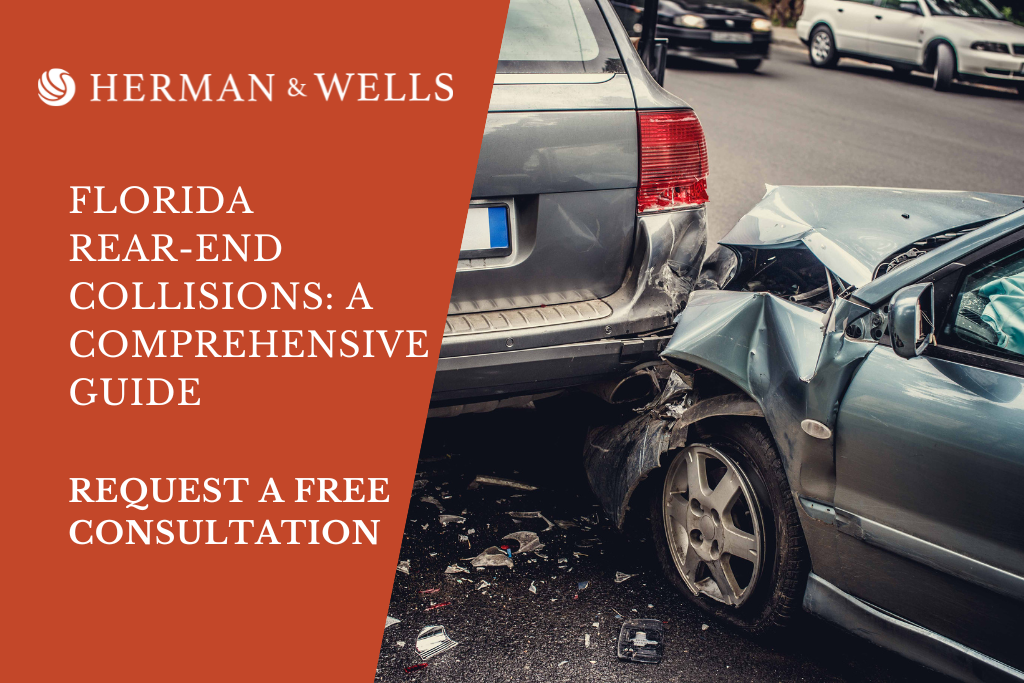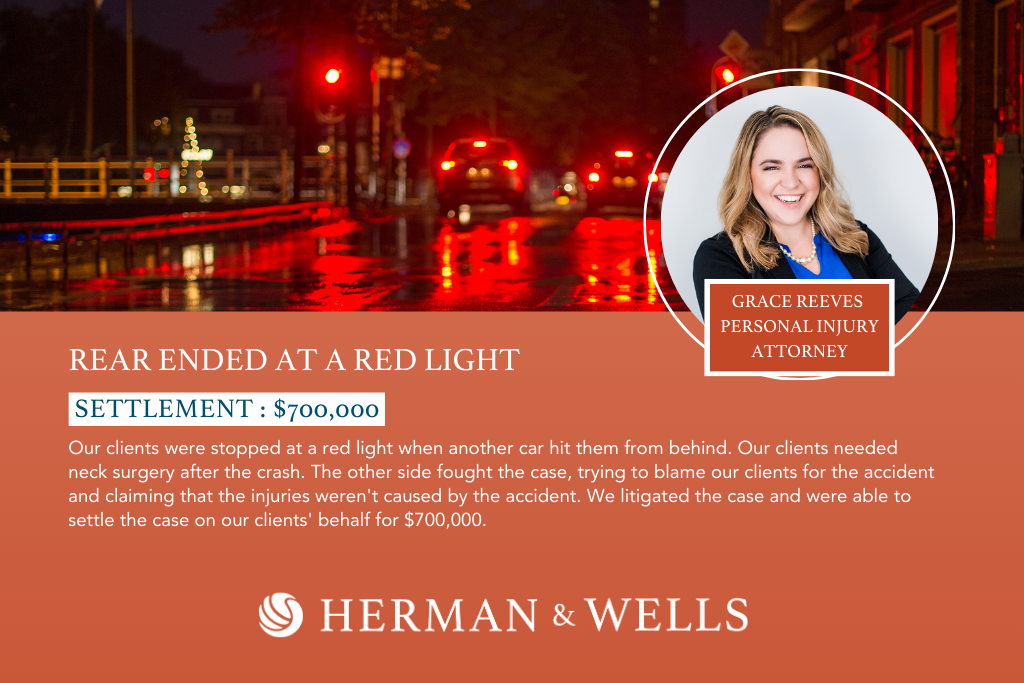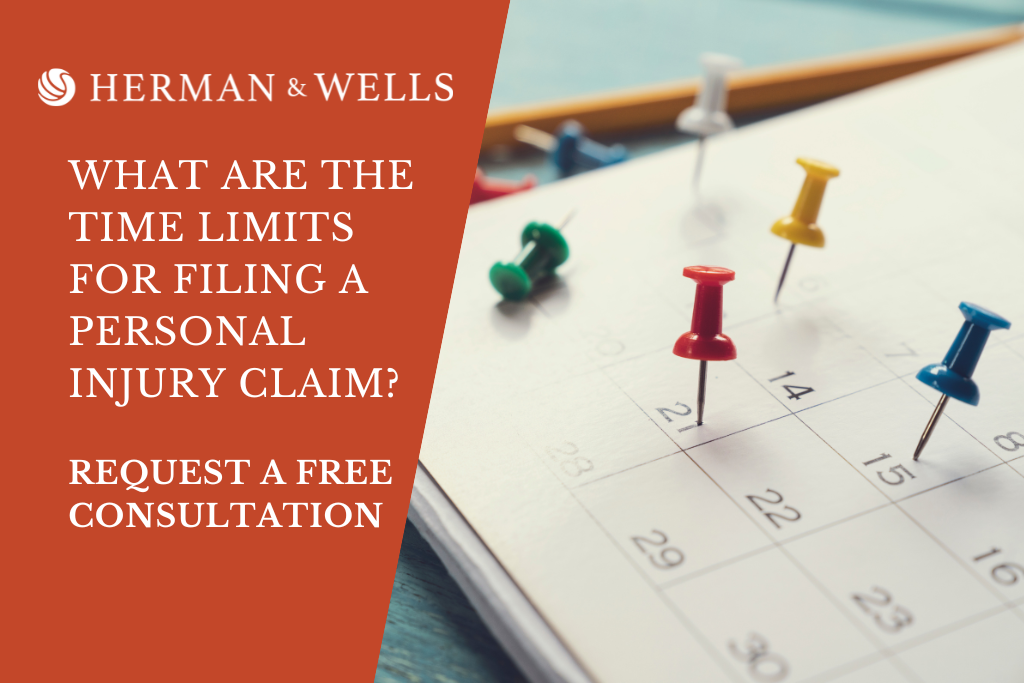Rear-end collisions are one of the most common types of car accidents in Florida, and they can have serious and life-altering consequences for those involved. Whether you’re a driver, passenger, or pedestrian, it’s important to understand the causes, common injuries, laws and regulations, and prevention tips for these accidents.
Imagine this, you are driving on the highway, minding your own business, and suddenly, you hear a loud noise, and the next thing you know, you are hit from behind. Your car is damaged, and you may have suffered injuries. The shock and confusion that follows a rear-end collision can be overwhelming, and many people don’t know where to turn for help.
But don’t worry, in this comprehensive guide, we will cover everything you need to know to help prevent rear-end collisions and protect yourself and your loved ones on the road.

The Cliff Notes: Key Takeaways From This Post
- 1Distracted driving, following too closely, speeding, poor weather conditions, mechanical failure and sudden stops are common causes of rear-end collisions.
- 2Common injuries resulting from rear-end collisions include whiplash, back injuries, traumatic brain injury (TBI), and soft tissue injuries. The point of impact can also influence the type of injuries sustained.
- 3Florida is a no-fault state for car insurance and follows comparative negligence law in case of an accident.
- 4To prevent rear-end collisions, drivers should keep a safe following distance, avoid distractions while driving, properly maintain their vehicle and be aware of weather and road conditions.
- 5Legal options for those involved in rear-end collisions include seeking medical attention, gathering evidence and filing a police report; then consulting with an experienced personal injury lawyer licensed to practice in the state of Florida.
Causes Of Rear-End Collisions
Distracted Driving
One of the leading causes of rear-end collisions is distracted driving. This includes activities such as using a phone, eating, applying makeup, and other activities that take a driver’s attention away from the road.
Following Too Closely
Another common cause of rear-end collisions is following too closely. When drivers fail to leave enough space between their vehicle and the one in front of them, they may not have enough time to react if the vehicle ahead stops suddenly.
Speeding
Speeding is another common cause of rear-end collisions, as it increases the likelihood that a driver will not be able to stop in time to avoid a collision.
Poor Weather Conditions
Weather conditions such as rain, fog, and snow can make it more difficult to see and stop, which can increase the likelihood of rear-end collisions.
Mechanical Failure
Rear-end collisions can also be caused by mechanical failures, such as faulty brakes or tires. Regularly maintaining your vehicle can help prevent these types of accidents.
Sudden Stops
Sudden stops can cause the driver behind to not have enough time to react and stop, resulting in a rear-end collision.
Common Injuries Resulting From Rear-End Collisions
Here’s a breakdown of some of the most common injuries that drivers and passengers can suffer as a result of a rear-end collision in Florida:
Whiplash
One of the most common injuries suffered in a rear-end collision is whiplash. This occurs when the head and neck are jerked forward and backward suddenly, causing strain on the muscles and ligaments. Symptoms can include neck pain, headaches, and stiffness.
Back Injuries
Rear-end collisions can also cause back injuries such as herniated discs, sprains, and strains, which can cause pain and limit movement.
Traumatic Brain Injury (TBI)
High-speed rear-end collisions can also cause a traumatic brain injury (TBI), which occurs when the brain is jolted or bumped inside the skull. Symptoms of TBI can include headaches, confusion, memory loss, and difficulty concentrating.
Soft Tissue Injuries
Rear-end collisions can also cause soft tissue injuries such as bruises, cuts, and abrasions. These types of injuries may be minor, but can be painful and take time to heal.
How Point Of Impact Changes Things
The point of impact can also play a role in the type of injuries suffered. For example, if the vehicle is hit in the front, the driver and front seat passenger may suffer injuries from the airbags deploying. If the vehicle is hit in the rear, the driver and rear seat passengers may suffer injuries from the seats or from being thrown forward.
It’s important to note that these are some of the most common injuries suffered in rear-end collisions, but each individual case can be different and the injuries can vary depending on the severity of the accident, the speed of the vehicles, and the point of impact.
Florida Laws And Regulations Pertaining To Rear-End Collisions
Florida’s No-Fault Car Insurance Law
Florida is a no-fault state for car insurance, which means that in case of an accident, each driver’s insurance company covers their own policyholder’s medical expenses, regardless of who was at fault. However, if the injuries are serious, long-lasting, or permanent, the person who was injured can file a claim against the at-fault driver’s insurance company or file a lawsuit.
How Is Liability Determined After A Rear-End Collision In The Sunshine State?
In Florida, liability in a rear-end collision is generally placed on the driver who rear-ends the other vehicle, as they are considered to be at fault for following too closely or not being able to stop in time. However, there may be certain exceptions, such as if the lead vehicle made an illegal or sudden stop, or if the rear-ending driver can prove that the lead vehicle’s brake lights were not working properly.
Florida’s Comparative Negligence Law
Florida follows comparative negligence law, which means that an injured party can still recover damages, even if they are found to be partially at fault for the accident. Still, the amount of recovery will be reduced by the percentage of fault attributed to the injured party. For example, if the injured party is found to be 25% at fault for the accident, any damages awarded will be reduced by 25%.
Please note that laws and regulations may have changed since this blog post was published (or updated). For that reason, it’s always best to consult with an experienced attorney that is licensed to practice in the state of Florida for the most up-to-date and accurate information.
Don’t hesitate to contact Herman & Wells at (727) 821-3195 for a free consultation.

Prevention And Safety Tips For Drivers
By following these tips and being aware of the causes and common injuries of rear-end collisions, you can help protect yourself and your loved ones on the road.
Keep A Safe Following Distance
One of the most important things you can do to prevent rear-end collisions is to keep a safe following distance. This means leaving enough space between your vehicle and the one in front of you so that you have time to react if the vehicle ahead stops suddenly. In general, a following distance of at least 3 seconds is recommended.
Avoid Distractions While Driving
Distracted driving is one of the leading causes of rear-end collisions. To prevent these accidents, it’s important to avoid distractions while driving, such as using your phone, eating, or applying makeup. Instead, focus on the road and your surroundings at all times.
Properly Maintain Your Vehicle
Regularly maintaining your vehicle can help prevent rear-end collisions. This includes checking your brakes, tires, lights, and other systems to ensure that they are in good working condition. A well-maintained vehicle is less likely to break down or have mechanical failure, which can cause a rear-end collision.
Be Aware Of Weather And Road Conditions
Weather and road conditions can greatly impact your ability to stop suddenly, so it’s important to be aware of these conditions when driving. Slow down or pull over if the weather is bad or the road conditions are poor and be extra cautious in areas where there are a lot of pedestrians or cyclists.
Use Your Blinkers
Turn signals are an important safety feature that let other drivers know your intentions and it’s important to use them when changing lanes or making turns. Failure to signal can cause confusion and lead to a rear-end collision.
Keep Headlights On
Always drive with your headlights on, especially during the day. This makes you more visible to other drivers and can help prevent rear-end collisions.
Legal Options For Those Involved In Rear-End Collisions
When it comes to rear-end collisions, the first step is to seek medical attention for any injuries. It is important to document any injuries and get a proper diagnosis, as it will be necessary for any potential legal action. After seeking medical attention, it is important to gather evidence of the accident, such as taking photos of the vehicles and the accident scene, getting the contact information of any witnesses, and filing a police report.
Once the medical attention and evidence-gathering are taken care of, it’s important to contact a personal injury lawyer who can help you navigate the legal process. Personal injury lawyers can investigate the accident and gather evidence, determine liability, and negotiate with insurance companies to help their clients receive fair compensation for their injuries and damages.
It’s important to note that in Florida, liability in a rear-end collision is generally placed on the driver who rear-ends the other vehicle, as they are considered to be at fault for following too closely or not being able to stop in time. However, there may be certain exceptions, such as if the lead vehicle made an illegal or sudden stop, or if the rear-ending driver can prove that the lead vehicle’s brake lights were not working properly. An experienced personal injury lawyer can help determine liability and advise on the best course of action to take for fair compensation.
It’s important to know that Florida is a no-fault state for car insurance, which means that in case of an accident, each driver’s insurance company covers their own policyholder’s medical expenses, regardless of who was at fault. But still, if the injuries are serious, long-lasting or permanent, the person who was injured can file a claim against the at-fault driver’s insurance company or file a lawsuit. A personal injury lawyer can help you to navigate this process.
How A Personal Injury Lawyer Can Help After A Rear-End Collision
When it comes to rear-end collisions, a personal injury lawyer can help an injured person in a number of ways.
- First and foremost, they can investigate the accident and gather evidence to determine liability.
- They can also negotiate with insurance companies to help their client receive fair compensation for their injuries and damages.
- They can also file a lawsuit and represent the client in court if necessary.
Investigating The Accident And Determining Liability
One of the key roles of a personal injury lawyer is to help clients navigate the legal process and ensure that they receive fair compensation for their injuries and damages. This includes determining liability, which is often placed on the driver who rear-ended the other vehicle.
However, there may be certain exceptions, such as if the lead vehicle made an illegal or sudden stop, or if the rear-ending driver can prove that the lead vehicle’s brake lights were not working properly. A personal injury lawyer can help determine liability and advise on the best action to take for fair compensation.
Florida’s Comparative Negligence Law
Another important aspect is that a personal injury lawyer can help even if their client is found to be partially at fault for the accident. Florida is a comparative negligence state, which means that an injured party can still recover damages, even if they are found to be partially at fault for the accident. Still, the amount of recovery will be reduced by the percentage of fault attributed to the injured party.
For example, if the injured party is found to be 25% at fault for the accident, any damages awarded will be reduced by 25%. A personal injury lawyer will help to negotiate with the insurance company to minimize the percentage of fault attributed to their client.
Understanding Florida No-Fault Law
Lastly, a personal injury lawyer can help you to understand the Florida no-fault law, how you can file a claim, and what compensation you are eligible for. They can also help you to understand and navigate the complex legal processes and ensure that you are treated fairly throughout the process.
Injured In A Rear-End Collision? Call Herman & Wells
In conclusion, rear-end collisions can be serious and life-altering events, and it’s important to understand the causes, common injuries, laws and regulations, and prevention tips. By being aware of these factors, you can take steps to protect yourself and your loved ones on the road. If you or a loved one have been involved in a rear-end collision, it’s important to seek medical attention and consult with a personal injury lawyer as soon as possible.
Personal injury lawyers can help you navigate the legal process, determine liability, negotiate with insurance companies, and fight for fair compensation for your injuries and damages. Even if you are found to be partially at fault for the accident, a personal injury lawyer can help you to recover damages.
At Herman & Wells, we understand the trauma and stress that comes with being involved in a rear-end collision and we are here to help you through the legal process. Our experienced attorneys will guide you through every step of the way and make sure that you receive the compensation you deserve. Don’t hesitate to contact us at (727) 821-3195 for a free consultation.





